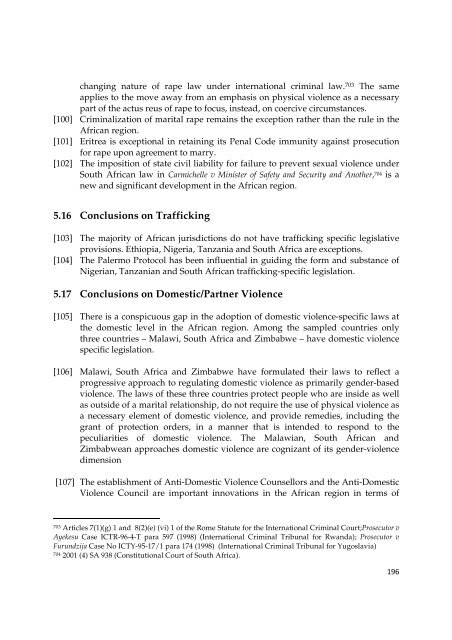sexual health and human rights in the african region - The ICHRP
sexual health and human rights in the african region - The ICHRP
sexual health and human rights in the african region - The ICHRP
Create successful ePaper yourself
Turn your PDF publications into a flip-book with our unique Google optimized e-Paper software.
chang<strong>in</strong>g nature of rape law under <strong>in</strong>ternational crim<strong>in</strong>al law. 703 <strong>The</strong> same<br />
applies to <strong>the</strong> move away from an emphasis on physical violence as a necessary<br />
part of <strong>the</strong> actus reus of rape to focus, <strong>in</strong>stead, on coercive circumstances.<br />
[100] Crim<strong>in</strong>alization of marital rape rema<strong>in</strong>s <strong>the</strong> exception ra<strong>the</strong>r than <strong>the</strong> rule <strong>in</strong> <strong>the</strong><br />
African <strong>region</strong>.<br />
[101] Eritrea is exceptional <strong>in</strong> reta<strong>in</strong><strong>in</strong>g its Penal Code immunity aga<strong>in</strong>st prosecution<br />
for rape upon agreement to marry.<br />
[102] <strong>The</strong> imposition of state civil liability for failure to prevent <strong>sexual</strong> violence under<br />
South African law <strong>in</strong> Carmichelle v M<strong>in</strong>ister of Safety <strong>and</strong> Security <strong>and</strong> Ano<strong>the</strong>r, 704 is a<br />
new <strong>and</strong> significant development <strong>in</strong> <strong>the</strong> African <strong>region</strong>.<br />
5.16 Conclusions on Traffick<strong>in</strong>g<br />
[103] <strong>The</strong> majority of African jurisdictions do not have traffick<strong>in</strong>g specific legislative<br />
provisions. Ethiopia, Nigeria, Tanzania <strong>and</strong> South Africa are exceptions.<br />
[104] <strong>The</strong> Palermo Protocol has been <strong>in</strong>fluential <strong>in</strong> guid<strong>in</strong>g <strong>the</strong> form <strong>and</strong> substance of<br />
Nigerian, Tanzanian <strong>and</strong> South African traffick<strong>in</strong>g-specific legislation.<br />
5.17 Conclusions on Domestic/Partner Violence<br />
[105] <strong>The</strong>re is a conspicuous gap <strong>in</strong> <strong>the</strong> adoption of domestic violence-specific laws at<br />
<strong>the</strong> domestic level <strong>in</strong> <strong>the</strong> African <strong>region</strong>. Among <strong>the</strong> sampled countries only<br />
three countries – Malawi, South Africa <strong>and</strong> Zimbabwe – have domestic violence<br />
specific legislation.<br />
[106] Malawi, South Africa <strong>and</strong> Zimbabwe have formulated <strong>the</strong>ir laws to reflect a<br />
progressive approach to regulat<strong>in</strong>g domestic violence as primarily gender-based<br />
violence. <strong>The</strong> laws of <strong>the</strong>se three countries protect people who are <strong>in</strong>side as well<br />
as outside of a marital relationship, do not require <strong>the</strong> use of physical violence as<br />
a necessary element of domestic violence, <strong>and</strong> provide remedies, <strong>in</strong>clud<strong>in</strong>g <strong>the</strong><br />
grant of protection orders, <strong>in</strong> a manner that is <strong>in</strong>tended to respond to <strong>the</strong><br />
peculiarities of domestic violence. <strong>The</strong> Malawian, South African <strong>and</strong><br />
Zimbabwean approaches domestic violence are cognizant of its gender-violence<br />
dimension<br />
[107] <strong>The</strong> establishment of Anti-Domestic Violence Counsellors <strong>and</strong> <strong>the</strong> Anti-Domestic<br />
Violence Council are important <strong>in</strong>novations <strong>in</strong> <strong>the</strong> African <strong>region</strong> <strong>in</strong> terms of<br />
703 Articles 7(1)(g) 1 <strong>and</strong> 8(2)(e) (vi) 1 of <strong>the</strong> Rome Statute for <strong>the</strong> International Crim<strong>in</strong>al Court;Prosecutor v<br />
Ayekesu Case ICTR-96-4-T para 597 (1998) (International Crim<strong>in</strong>al Tribunal for Rw<strong>and</strong>a); Prosecutor v<br />
Furundzija Case No ICTY-95-17/1 para 174 (1998) (International Crim<strong>in</strong>al Tribunal for Yugoslavia)<br />
704 2001 (4) SA 938 (Constitutional Court of South Africa).<br />
196
















